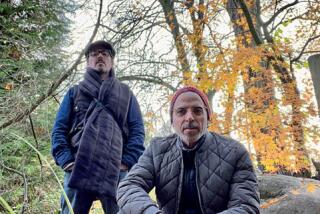MUSIC / ZAKIR HUSSAIN : Tabla Player Still Rooted in Rhythms of India
- Share via
San Anselmo is one of those lushly wooded small towns in Marin County within easy access of San Francisco, but a world away from the urban reality. Its population is 13,000, which for the past 20 years has included internationally acclaimed tabla player Zakir Hussain and his family.
San Anselmo is also a world away from India, where Hussain began his life, musical and otherwise. The son of tabla player Ustad All Rakha, Hussain was a precocious virtuoso who began giving concerts at age 12 and, through his father, began playing with Ravi Shankar.
Then came a migration to the United States in 1970 and a whirlwind career that has seen him collaborating with pop idols the likes of George Harrison, jazz guitar great John McLaughlin, and Grateful Dead drummer Mickey Hart. Hart’s hot-selling, Grammy-winning 1992 album “Planet Drum” featured Hussain along with Santa Barbara-based Brazilian great Airto and other percussionists.
As diverse as his musical workload has been, Hussain is still primarily rooted in Indian classical music, which he will be playing when he performs in concert at UCSB on Tuesday.
His first such solo appearance in the area came at the behest of Scott Marcus, the enterprising head of the UCSB Middle Eastern and Indian ensembles. Apart from his public concert, he will also talk and perform with students during the day.
“Basically,” Hussain explained, “the format is to bring somebody to the university and have them interact with the students from that particular tradition and also give some of his own perspective.”
Here in San Anselmo, in the upstairs of the historic Hobson mansion, Hussain has set up shop with his latest venture, running his own Moment! record label.
One afternoon last week, Hussain was looking only a bit winded as he came into the office for an interview, having just raced over from a rehearsal with sitarist Ali Akbar Khan in the neighboring town of San Rafael. The next day, Hussain would catch a plane to Los Angeles to do a concert with Ravi Shankar.
It was Khan who first lured Hussain to Marin County two decades ago, to teach at his Ali Akbar College of Music. Before long, Hussain was lured away from regular teaching to various projects, such as the highly regarded Indian-jazz group Shakti with McLaughlin in the late 1970s.
McLaughlin also played on Hussain’s fascinating cross-cultural solo album, “Making Music,” put out on the ECM label in 1987.
These days, Hussain also leads a multicultural percussionist group called the Rhythm Experience, which, like the multiple drummer format of “Planet Drum,” involves a dialogue of percussionists from different cultural corners of the world.
How is it that percussionists seem to work well together in groups, as compared to other instrumentalists, even when coming from different ethnic traditions?
“If they get mad at each other, they just go to their drums and beat them,” he says, laughing. “It’s quite possible that the reason drummers are fun or more relaxed than other musicians is simply because they can beat it out. It’s the therapy aspect. Drum circles are about the same thing--they beat it out.”
Regarding the success of “Planet Drum” and other drum-related works, Hussain believes that “one of the reasons why rhythm is starting to come to the forefront is simply because people are starting to relate to their physical self.”
The impetus for starting his own company stemmed from a desire to present Indian classical music in the proper light, and also to give a fair business shake to its musicians.
“The best moments of Indian classical music are onstage,” Hussain said. “I still remember so many concerts by great masters that I would have given my right arm to be able to have them available to me to listen to later.
“I felt it was important that Indian music should be presented the way it usually is heard, in its live atmosphere. It should be heard in its entirety, in a complete rendition, as opposed to being tailored (and shortened) for a record.”
Also, as Hussain explained, in the past, Indian musicians haven’t been treated equitably in terms of royalties for their work.
“With this company, the musicians can be a part of the whole production, and therefore then, take their own publishing, their mechanical royalties--whatever should be coming to them is there.”
In addition to traditional Indian recordings, Moment! will also release varied world music projects, such as a proposed project with Hussain, Ginger Baker and Jack Bruce.
Hussain reasoned: “It’s not an easy job, but see, we are not looking at being a major company. We are not looking at putting out a CD that we expect to sell a million copies of in six months. We want to put out music that we feel justified in putting out.
“It’s for people who are aware of what culture and tradition is. If it sells, it sells. We’re not looking for a platinum record. We’re looking for platinum listeners,” he snickered, perhaps realizing that he had just come up with an ad slogan.
* WHERE AND WHEN
Zakir Hussain will perform with the UCSB Indian Music Ensemble at UCSB’s Lotte Lehmann Concert Hall on Tuesday at 8 p.m. Tickets: $12, $10 and $7. Information, 893-3535.
More to Read
The biggest entertainment stories
Get our big stories about Hollywood, film, television, music, arts, culture and more right in your inbox as soon as they publish.
You may occasionally receive promotional content from the Los Angeles Times.










